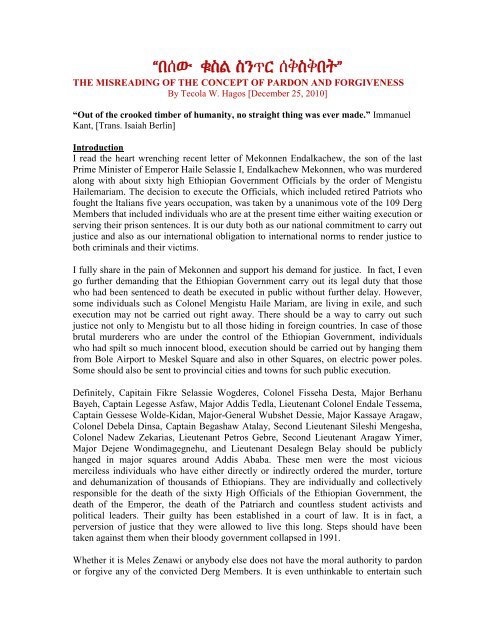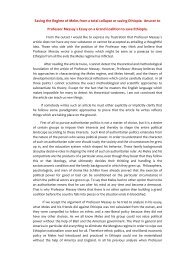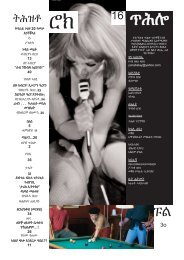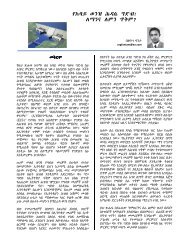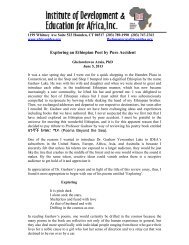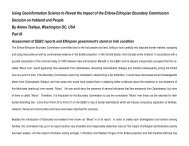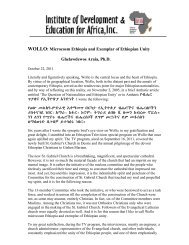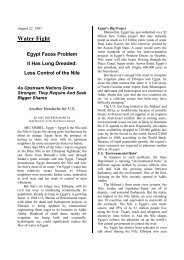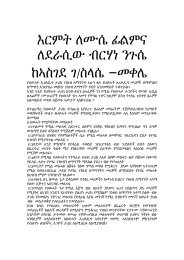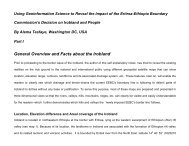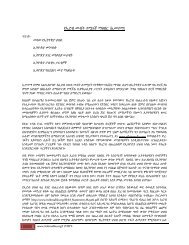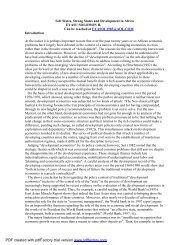በሰው ቁስል ስንጥር ሰቅስቅበት - Tecola Hagos
በሰው ቁስል ስንጥር ሰቅስቅበት - Tecola Hagos
በሰው ቁስል ስንጥር ሰቅስቅበት - Tecola Hagos
You also want an ePaper? Increase the reach of your titles
YUMPU automatically turns print PDFs into web optimized ePapers that Google loves.
“<strong>በሰው</strong> <strong>ቁስል</strong> <strong>ስንጥር</strong> <strong>ሰቅስቅበት</strong>”<br />
THE MISREADING OF THE CONCEPT OF PARDON AND FORGIVENESS<br />
By <strong>Tecola</strong> W. <strong>Hagos</strong> [December 25, 2010]<br />
“Out of the crooked timber of humanity, no straight thing was ever made.” Immanuel<br />
Kant, [Trans. Isaiah Berlin]<br />
Introduction<br />
I read the heart wrenching recent letter of Mekonnen Endalkachew, the son of the last<br />
Prime Minister of Emperor Haile Selassie I, Endalkachew Mekonnen, who was murdered<br />
along with about sixty high Ethiopian Government Officials by the order of Mengistu<br />
Hailemariam. The decision to execute the Officials, which included retired Patriots who<br />
fought the Italians five years occupation, was taken by a unanimous vote of the 109 Derg<br />
Members that included individuals who are at the present time either waiting execution or<br />
serving their prison sentences. It is our duty both as our national commitment to carry out<br />
justice and also as our international obligation to international norms to render justice to<br />
both criminals and their victims.<br />
I fully share in the pain of Mekonnen and support his demand for justice. In fact, I even<br />
go further demanding that the Ethiopian Government carry out its legal duty that those<br />
who had been sentenced to death be executed in public without further delay. However,<br />
some individuals such as Colonel Mengistu Haile Mariam, are living in exile, and such<br />
execution may not be carried out right away. There should be a way to carry out such<br />
justice not only to Mengistu but to all those hiding in foreign countries. In case of those<br />
brutal murderers who are under the control of the Ethiopian Government, individuals<br />
who had spilt so much innocent blood, execution should be carried out by hanging them<br />
from Bole Airport to Meskel Square and also in other Squares, on electric power poles.<br />
Some should also be sent to provincial cities and towns for such public execution.<br />
Definitely, Capitain Fikre Selassie Wogderes, Colonel Fisseha Desta, Major Berhanu<br />
Bayeh, Captain Legesse Asfaw, Major Addis Tedla, Lieutenant Colonel Endale Tessema,<br />
Captain Gessese Wolde-Kidan, Major-General Wubshet Dessie, Major Kassaye Aragaw,<br />
Colonel Debela Dinsa, Captain Begashaw Atalay, Second Lieutenant Sileshi Mengesha,<br />
Colonel Nadew Zekarias, Lieutenant Petros Gebre, Second Lieutenant Aragaw Yimer,<br />
Major Dejene Wondimagegnehu, and Lieutenant Desalegn Belay should be publicly<br />
hanged in major squares around Addis Ababa. These men were the most vicious<br />
merciless individuals who have either directly or indirectly ordered the murder, torture<br />
and dehumanization of thousands of Ethiopians. They are individually and collectively<br />
responsible for the death of the sixty High Officials of the Ethiopian Government, the<br />
death of the Emperor, the death of the Patriarch and countless student activists and<br />
political leaders. Their guilty has been established in a court of law. It is in fact, a<br />
perversion of justice that they were allowed to live this long. Steps should have been<br />
taken against them when their bloody government collapsed in 1991.<br />
Whether it is Meles Zenawi or anybody else does not have the moral authority to pardon<br />
or forgive any of the convicted Derg Members. It is even unthinkable to entertain such
2<br />
idea by anyone. I am starting this essay with the assertion that weak and/or despotic<br />
societies “forgive,” but powerful/democratic communities dispense justice. This assertion<br />
may be as provocative as it is simple, indeed. It is also my observation that people who<br />
are too eager to forgive their abusers, tend to abuse others in their turn. It is a fact that<br />
those who are publicly perceived to be the paragon of virtue are wanting in their private<br />
lives where virtue truly matters. In a world where people have difficulties going over a<br />
much lower threshold of “fairness,” it is appropriate to set “justice” as a social goal rather<br />
than pursue acts of “forgiveness” or “pardon” as a solution in social conflicts or crimes.<br />
II. The Unthinkable: Those Murdered were not Dogs<br />
I am appalled that the unthinkable is happening now. The pleading for the pardon of Derg<br />
Officials is happening now spearheaded by none other than the discredited Patriarch of<br />
the Ethiopian Orthodox Church, who had embarrassed us all, the Faithful, through his<br />
inequities and corruption. And the last being his vainglorious edification of his own<br />
person in a statute. I have been informed by some concerned Ethiopians that the Patriarch<br />
is a blood relation of Fissiha Desta and that the Patriarch is trying to have the release of<br />
that bloody criminal who should be hanged right away. Here we are witnessing a<br />
misplaced piety. There is no socially justifiable reason to pardon any of the Derg<br />
Members who were given due process and convicted for their brutal crims.<br />
There is absolutely nothing to gain by having those brutal former Derg officials around,<br />
but a lot would be gained by a just judgment of execution for the murderous crimes they<br />
committed. The cry for justice of the tens of thousands who suffered and some who died,<br />
and some who were tortured et cetera is still waiting for a just answer. Such voices of<br />
pain and cries for justice all over Ethiopia for the last twenty years were never properly<br />
answered by the current Ethiopian Government. The current Ethiopian Government had<br />
failed us by delaying unnecessarily the fair trails of such criminals and using those<br />
criminals as some kind of bargaining chips or as items for propaganda purposes. Now<br />
that judgments had been entered, such judgments must be carried out.<br />
Mekonnen wrote a public letter on December 23, 2010 succinctly and rightly stating why<br />
pardoning such convicted criminals would be an injustice to the victims and to Ethiopians<br />
as a whole. It seems to me that the Ethiopian Government might be playing a dubious<br />
role of trying to convince the Ethiopian public that it has the approval of the families of<br />
the victims for it to grant pardon to those criminal Derg Members. “Some of the articles<br />
which were printed suggested that the families of some of the victims of the Dergue had<br />
been contacted about the issue of a pardon and had stated that they had no objections to<br />
the idea. I can categorically say that no one contacted any member of any family that I<br />
know of to request comment on this issue. For that matter, no member of the committee<br />
which manages and maintains the Memorial for the 68 Former Officials Executed by the<br />
Dergue was asked for their opinions on this matter. Therefore, it would be interesting to<br />
know who was asked and what their rationale (if any) was for giving their blessing for<br />
this ludicrous venture.”<br />
If people were truly interested to bring justice to the people of Ethiopia, they ought to be<br />
concerned about the dictatorship of Meles Zenawi and his EPRDF political party that had
3<br />
rigged elections and have transformed the country into a one man show. The<br />
unemployment of the young and the hopeless condition of life in Ethiopia is truly a far<br />
more serious matter than the issue of pardoning a handful of convicted criminals. The<br />
leasing of millions of hectares of fertile land to foreigners while Ethiopians do not even<br />
have ownership rights on their own land, the lack of political rights, et cetera are all<br />
unconscionable situations that should be addressed right away. It is hypocrisy for anyone<br />
to spend time and effort on convicted criminals who had caused so much damage and<br />
murders rather than care about innocent Ethiopians who have been abused, tortured,<br />
imprisoned, and disfranchised by the current Government.<br />
I agree with Mekonnen when he stated, “For those that are actively pursuing this issue<br />
and suggesting that justice has been already served, I have but one thing to<br />
say……SHAME ON YOU! Using this very sensitive issue to advance whatever personal<br />
agenda you might have is despicable and a major disservice to this blessed country of<br />
ours, and shows great disrespect for the many valuable Ethiopian lives which were lost<br />
during those dark 17 years of Dergue repression.” A mere twenty years does not even<br />
start to register as a punishment for the murder and torture committed by those Derg<br />
brutal officials listed above.<br />
Let me say to all that as Dostoevsky facing a firing squad, later stated that the experience<br />
of facing death concentrated his mind quickly, I too suffered a similar situation in the<br />
hands of those same Derg Officials when I was dragged out from my Alem-Bekagn<br />
Prison Cell chained with another Prisoner to face their brutal firing squad that murdered<br />
the sixty Government Officials on November 23, 1974. At the last minute, just before we<br />
were lined up with the other victims, we were informed that there was an error and<br />
returned to our Cell. However, my fellow prisoners and I heard the barrage of gun fires<br />
and some screaming from our prison Cell. And in the morning I learned first hand from<br />
the accounts of fellow prisoners who collected the dead bodies, mutilated body-parts et<br />
cetera and put them in a mass grave right in the prison compound, the gruesome detail of<br />
the massacre. The detail was the most harrowing that I hesitate to repeat here. For years I<br />
had nightmares of that night, but I also lost all fear of dying, and greatly developed<br />
excruciating empathy with all those who suffer in the hands of brutal dictators.<br />
III. Justice not Vendetta<br />
I am not writing here simply seeking vendetta or vengeance, but justice. It is impossible<br />
to build a civil society without taking steps against criminals who violate the rights of<br />
individuals in the guise of political goals and state craft. We cannot afford to allow such<br />
known criminals go free after they have committed horrendous crimes against innocent<br />
individuals. Pardoning them is the worst thing to do, and it is like murdering and<br />
torturing the victims all over again. I quote Mekonnen here for his wise conclusion:<br />
“Due process was followed, and justice according to the Ethiopian Code of Law was<br />
delivered. That is more than can be said of the mock justice meted out by these<br />
individuals during their long time in power. As such, they should suffer the consequences<br />
of their actions and serve their sentences without any interference from supposed<br />
„concerned‟ external factions…… justice and history demands that, at the very least.”
4<br />
Here below are names of the first sixty high officials of the Ethiopian Government<br />
victims of the Derg. These individuals were as real human beings as anyone of us, who<br />
were never given any fair trail but brutally murdered by the order of the Derg whose<br />
Members are now campaigning pleading for pardon through shameful surrogates.<br />
The list of Officials of the Imperial government that were brutally murdered at<br />
night on November 23, 1974 without trial. Titles are in italics<br />
Prime Minister Tsehafi Taezaz Aklilu<br />
Habtewold<br />
Prime Minister Lij Endalkatchew<br />
Makonnen<br />
Lt. General Abiye Abebe<br />
H.H. Prince (Leul Ras) Asrate Kassa<br />
Prince Rear Admiral Iskinder Desta<br />
Ras Mesfin Sileshi<br />
Ato Abebe Retta<br />
Ato Akale Work Haptewold<br />
Lt. Colonel Tamirat Yigezu<br />
Dejazmatch Kifle Irgetu<br />
Lt. General Kebede Gebre<br />
Lt. General Issayas Gebre Igziabiher<br />
Lt. General Asefa Ayana<br />
Ato Mulatu Debebe<br />
Dr. Tesfaye Gebre Igzi<br />
Dejazmatch Workineh Wolde<br />
Amanuel<br />
Lt. General Debebe Haile Mariam<br />
Brigadier General Deresse Dubale<br />
Lt. General Asefa Demisse<br />
Dejazmatch Aemero Selassie Abebe<br />
Dejazmatch Solomon Abreha<br />
Dejazmatch Sahelu Difeye<br />
Dejazmatch Worku Inqu Selassie<br />
Dejazmatch Legese Bezu<br />
Major Berhane Mecha<br />
Colonel Solomon Kedir<br />
Blata Admasu Retta<br />
Ato Nebiye Leul Kifle<br />
Ato Solomon Gebre Mariam<br />
Ato Tegegn Yetashework<br />
Afe Nigus (Lord Chief Justice) Abeje<br />
Debalke<br />
Lt. General Haile Baikedagn<br />
Lt. General Abebe Gemeda<br />
Lt. General Yilma Shibeshi<br />
Lt. General Belete Abebe<br />
Dejazmatch Kebede Ali Wele<br />
Major General Gashaw Kebede<br />
Major General Seyoum Gedle Giorgis<br />
Major General Tafesse Lemma<br />
Lij Hailu Desta<br />
Fitawrari Amde Abera<br />
Fitawrari Tadesse Inqu Selassie<br />
Fitawrari Demisse Alamirew<br />
Kegnyazmatch Yilma Aboye<br />
Brigadier General Wendimu Abebe<br />
Brigadier General Girma Yohannes<br />
Brigadier General Mulugeta Wolde<br />
Yohannes<br />
Colonel Yigezu Yimene<br />
Colonel Alem Zewd Tessema<br />
Colonel Tassew Mojo<br />
On this same day, the following men died fighting the Derg protecting Lt. General<br />
Aman Andom who refused to sanction the execution of the Imperial Officials:<br />
Lt. General Aman Mikael Andom<br />
Leutenant Belai Tsegaye<br />
Leutenant Demisse Shiferaw Goshiye<br />
Lance Corporal Bekele Wolde Giorgis<br />
Sub-Corporal Tekle Haile<br />
Lance Corporal Tesfaye Tekle<br />
Junior Aircraftsman Yohannes Fitiwi
These are known today in Ethiopia as "Silsawochu" or "The Sixty". Their deaths<br />
marked the beginning of the Derg's reign of terror. Later, Emperor Haile Selassie<br />
and Patriarch Tewoflos were murdered by Mengistu Hailemariam.<br />
5<br />
No one is claiming that the above named former Officials of the Ethiopian Government<br />
were perfect men. Now having lived through the Derg‟s brutal and violent Government<br />
and the current corrupt and anti-Ethiopia Leadership, I can say without hesitation that the<br />
individuals listed above were far more honorable and civilized men, and some of them<br />
were outright great heroes by contrast. It is a tragedy of circumstances with an aging<br />
Emperor and a tired bureaucracy that the least knowledgeable and the least capable<br />
members of society took over power and committed the worst violence and mass murder<br />
in the history of Ethiopia. It had been a downward spiral ever since.<br />
To the above list of victims add tens of thousands who were murdered during the Red<br />
Terror in 1977 to 1978 and there after until the Military rule ended in 1991. The total<br />
death by some is estimated over a million. These same individuals on whose behalf the<br />
shameful campaign for pardon is being undertaken were part of the criminal Government<br />
of Mengistu Hailemariam that caused havoc and devastation on Ethiopia and Ethiopian<br />
Citizens. Just because we are faced with another brutal and savage Government now, it<br />
does not mean that we have to exonerate the Derg criminal officials now.<br />
Here below I am discussing the concept of public “Pardon” or “Forgiveness” its<br />
limitations and its power to enable society to move forward. There is some confusion<br />
between the meaning of “pardon” and “forgiveness.” Moreover, people tend to use these<br />
two distinct terms interchangeably. At any rate, for the purpose of this essay, “pardon”<br />
refers to the act of the legal authority of a State, whereas “forgiveness” is far more<br />
closely related to the psychological commitment of the individual aggrieved party. I have<br />
added this section from a previous research material posted in my Website,<br />
www.tecolahagos.com, a few years back. It is meant to enhance the concept of<br />
forgiveness and deepen our understanding of such difficult concept.<br />
IV. The Issue of Pardon or Forgiveness as a Legal Regime<br />
Delaminating ethics from law was considered by many jurists (Austin, Hart et cetera) as a<br />
step forward in legal development. Is it possible to make similar claim by disassociating<br />
ethics from politics? May be the question is not a fair one, since politics is more of a<br />
process than a series of rules and limits as is the case with law, and thus far more difficult<br />
to distinguish questions of ethics from questions of politics. This dissociative outlook<br />
may be due to the empiricist and materialist view of ethics to be based or a result of<br />
emotion and not of reason wherein “Law” is perceived to be purely a process or result of<br />
reason. For example, Aristotle in his Politics stated that “the law is reason unaffected by<br />
desire.” [Aristotle, Politics, Book III, chapter 16, Benjamin Jowett translation]<br />
It is impractical if not outright impossible to structure a legal regime around the concept<br />
of “forgiveness.” If a legal system uses “forgiveness” as one of its tools, it will be<br />
undermining far more important legal concepts such as equal treatment, fair and just
6<br />
resolution of controversy, consistency and certainty et cetera all very fundamental<br />
concepts in any legal system. In Ethiopia‟s legal tradition, before the modernization of<br />
the legal system was initiated by Emperor Haile Selassie in the 1930s, the Sovereign was<br />
the ultimate judge of capital crimes and serious crimes; however, in the punishment phase<br />
of the process, family members of the victim were allowed a say in what type of<br />
punishment to impose on the criminal. Both oral tradition and the Fetha Negest are great<br />
sources of cases where the justice of past Ethiopian kings and Emperors could be studied<br />
and admired.<br />
There are many troubling questions in connection with the concept of forgiveness<br />
especially if the implementation of which ends up freeing individuals or groups who have<br />
committed serious crimes of murder, torture, and imprisonment in the name of national<br />
security or political change. Obviously, what is needed in such situations is justice in<br />
accordance with the criminal law of the state of jurisdiction and/or the use of<br />
international legal concepts that are peremptory norms of customary international law<br />
and practices whether derived from treaties or judgments of international courts,<br />
tribunals, or arbitration forums.<br />
Foremost, in the discourse underway at political forums, universities, civic organizations<br />
et cetera on the issue of national “reconciliation,” there may be serious confusion or<br />
misunderstanding of conceptual terms such as “forgiveness,” “amnesty,” “mercy,”<br />
“immunity,” and “clemency” in association with truth and/or reconciliation commissions.<br />
There have been several truth or reconciliation commissions (tribunals or committees) in<br />
the last thirty years in many parts of the world in almost all of the Continents. However, I<br />
do not believe the human condition has improved at all due to such effort. Very many<br />
well intentioned individuals inadvertently have polarized the issue of justice with their<br />
advocacy of forgiveness and reconciliation. There is a degree of confusion in the<br />
approach of placing the idea of forgiveness as part of the process of political and legal<br />
solutions to the injustices suffered by many in Ethiopia or elsewhere in the World.<br />
If we assume, for argument sake, that to forgive a criminal or an organization<br />
(community) that had committed some harm to an individual, a family, or a community is<br />
an ethical act and may even be considered as a courageous religious/spiritual behavior,<br />
there are certain conclusions that flow logically from such assumptions that we may not<br />
endorse. The obvious question that comes to mind is why the victims and their families<br />
should bear the burden of a difficult moral judgment to benefit the rest of society,<br />
especially when such society had failed to protect them from atrocities to begin with.<br />
There is no point referring to events or ideas from any historic time.<br />
Where the atrocity or criminal act is a result of civil disobedience, it may be far more<br />
difficult to withhold special considerations such as forgiveness or mercy. However, even<br />
under such circumstances of civil disobedience, philosophers, such as Rawls, suggest that<br />
those who participate in activities of civil disobedience must not committee any violence<br />
or expect immunity from prosecution for their activities. But that approach does not<br />
address non-violent actions harmful to the security of a state. For the assumption in such
7<br />
form of dissention is that no one can be forced to live under laws that contravene<br />
fundamental human rights of individuals.<br />
There are precedent setting international conventions such as the Genocide Convention<br />
and others through the United Nations system that are relevant to the resolutions of<br />
conflicts. For example, international customary law principles such as the Nuremberg<br />
Principles, the Japanese war crimes Commission, the Rwanda Commission, the decisions<br />
of the International Court of Justice, the recent International Criminal Court process et<br />
cetera that maybe used as the basis for setting standards to effect justice in the world<br />
before implementing a system of forgiveness and reconciliation.<br />
As indicated in my introduction, the granting of “pardon” or “forgiving” the criminal acts<br />
of an individual or that of a group that violated international standards under the<br />
Genocide Convention or any other bilateral or multilateral treaties may itself be<br />
considered a violation that may be a subject of sanctions imposed by the international<br />
community. The Rome Statue has created the International Criminal Court, and the Court<br />
is already fully functional. Thus, signatory states to the Rome Statue have the obligation<br />
to cooperate with the International Criminal Court in the prosecution of individuals who<br />
have committed such crimes such as genocide or crime against humanity. If individual<br />
states negotiate with criminals and grant “amnesty” or “forgive” such crimes, such states<br />
would undermine the role of the International Criminal Court. The question is whether<br />
we are putting the cart before the horse with such ideas of forgiving criminals? It is<br />
impractical and counterproductive to use the concept of “forgiveness” or “pardon” as a<br />
legal remedy or as public policy.<br />
The provocative article “On the Pleasure of Hating” by the Nineteenth Century celebrated<br />
curmudgeon William Hazlitt6 is a proper essay to bring to your attention in order to<br />
remind you that there is more to seeking justice than mere philosophy and legalism—the<br />
psychological components are as important. In this regard, the ancient Greeks have a<br />
most expressive term Κάθαρσις “catharsis” that describes the psychological state of mind<br />
an individual undergoing such “catharsis.” The term can be roughly translated to mean<br />
“purification of” or “purging of” oneself from the pollution of the feeling of being a<br />
victim. In other words, it is not only “forgiveness” that allows the human inner self to<br />
clean itself of polluting feelings to move away from the confinement and negativity of<br />
victimhood, but properly conducted retaliation or “catharsis” would do as well. For the<br />
sake of our sanity and for the sake of the wellbeing of future generations we must punish<br />
criminals such as the brutal and violent convicted criminals of the Members of the Derg.<br />
Ω<br />
<strong>Tecola</strong> W. <strong>Hagos</strong><br />
December 25, 2010


